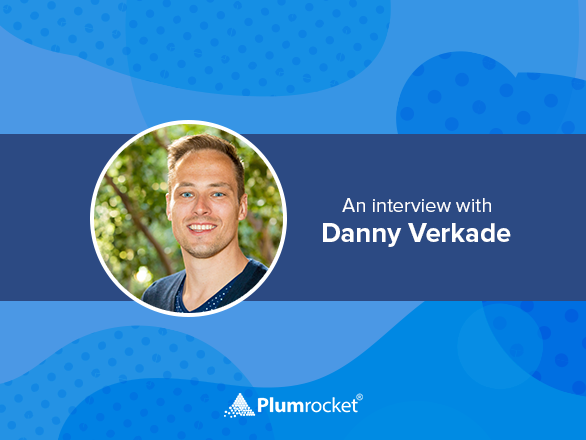An Interview with Danny Verkade: “The main advantages of the Magento platform are all the out-of-the-box features.”
Editor’s note: E-Commerce is growing at an unprecedented rate all over the globe, so it is important to keep up with the times and explore new trends in order to stay competitive. Today, Plumrocket team is please to present an interview with Danny Verkade. Recognised e-commerce expert and Magento master, Danny shares his knowledge and experience with our readers. So, get ready to absorb his views, thoughts, and pieces of advice below.
1. Danny, first of all, tell us a bit about yourself. What inspired you to select such career path? How did you get into the e-commerce industry? What’s your greatest Magento achievement?
First of all, thanks for having this interview with me. I’m Danny Verkade and I’m a co-owner and the CTO of an agency called Cream. Cream is a leading e-commerce solution provider for the Magento platform based in the Netherlands. I’ve always been interested in the Internet as a whole and software development from a young age, so my parents got me my first Internet connection somewhere around 1998 or 1999. So it was pretty clear that after high school I wanted to get into IT. During my university years I was introduced into the world of e-commerce. What I like about this field in particular is that technology is important, but so is marketing and user experience in order to get the best value out of a specific platform for the merchant. Since e-commerce is the core business of a lot clients you can truly make a difference for them to move and excel their business forward.
2. Being a Magento expert, what are some of the top Magento advantages? Are there any limitations to the Magento software?
The main advantages of the Magento platform are all the out-of-the-box features. Another benefit is the huge community surrounding the Magento platform. There are so many talented people to learn from regarding new technologies, user experience, etc. This is something that differentiates Magento from other e-commerce platforms. Furthermore Magento is highly extensible and offers numerous ways the adapt the platform to the specific needs of the merchant. This advantage however might also be the drawback. You can easily make the wrong architecture decisions and over engineer the platform and create a really complex e-commerce platform or environment which is difficult to maintain and update.
3. In your opinion, what is the main role of Magento extensions? How can e-store owner benefit from the plugins?
As mentioned the Magento platform has a lot of extensions points which can be used to adapt the platform to your specific business needs. A lot of other merchants might want to have the same functionality change. This is the point where 3rd party plugins of modules come in to play. For a merchant these modules can be used to extend the Magento platform to fit their business needs without the cost of custom development. So the benefit for a merchant will be a lower total cost of ownership and a faster time to market for certain features. When I’m discussing certain functionality with a merchant we will first check if the functionality is available within core features of the Magento platform. If it’s not, I’ll check for modules that offer the particular functionality. If those are not available we will discuss the possibilities with the merchant to do custom development to create the particular feature.
4. As I can see from your profile, you obtain different Magento certifications. Can you single out to the importance of passing these items?
For me personally the Magento certifications are important. Holding one or more certifications shows that you have a certain level of expertise and that you will be able to use the Magento platform in the way it is intended to be by using industry standards and best practices. Professionally this sets you apart from other PHP developers, frontend developers and project managers working with the Magento platform. I do not hold all the certifications offered for Magento 2, so it is my personal goal to pass some exams for the Magento 2 certifications next year.
5. At Imagine 2018, the creation of a new global Magento Association was announced. I have researched that you are a part of the Task Force team. Congratulations! What is the main goal of the Association? How do you describe your role and what are your key responsibilities?
I’ve been asked by Magento to be on the Magento Association Task Force, which does all the groundwork for the Association to get it up and running. In total the Task Force consists of 7 people from the Magento Community. We have been working on quite a few different things, such as creating the mission statement, vision statement, culture statement, bylaws and a strategic plan for the Magento Association. We are currently in the process of selecting the first board of directors for the Magento Association, which will be announced somewhere in mid-January. So early in 2019 the Magento Association will be up and running and will be much more visible for the whole Magento community.
6. Danny, you have visited MagentoLive Europe 2018. What was your experience of attending the conference? Can you suggest our readers the interesting e-commerce and Magento events to visit in 2019?
This was the first year Magento organised a big event in Europe. They have been doing MagentoLive events before but on a much smaller scale. The Magento community really managed to get together in Barcelona for MagentoLive Europe and they put on a great event. I would suggest everybody to go to Magento Imagine in Las Vegas. This is the main Magento event, where all the big announcements are made. You can talk to a lot of people from Magento itself, as well as other developers and merchants. Everybody that has something to do with the Magento platform from all over the globe is attending this conference. So if you are looking to expand your personal network within the Magento community this is the place to be.
7. To sum up, the new year is here. What are the main e-commerce and Magento predictions for 2019?
Magento 2 is getting more mature and we will see a lot of great new features which can be used by merchants, such as the multi source inventory functionality, PWA and the Page Builder which will be standard functionality for Magento Commerce and can be bought as an extension for Magento Open Source. We will see Magento integrating more and more with other Adobe products. The Magento Association will be up and running and will truly become a voice for the Magento community. I think 2019 will be another exceptional year for Magento and the Magento community as a whole.
We want to say many thanks to Danny for the in-depth interview with useful insights on e-commerce industry and Magento platform that can help our readers reach the desired business results. Wish Danny all the best of joy and inspiration!




